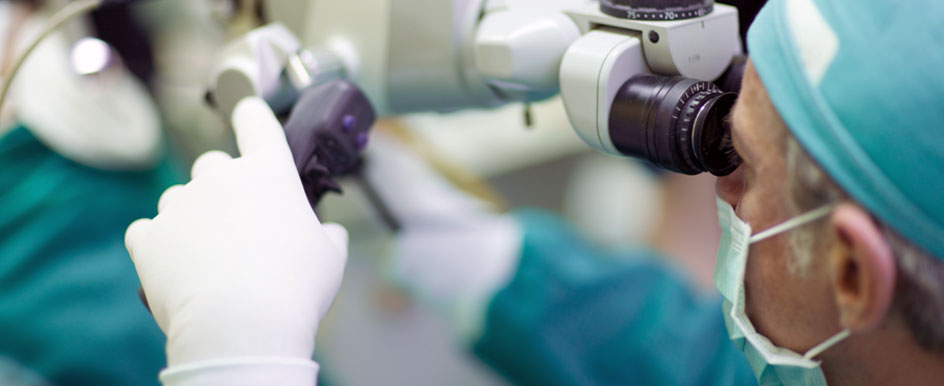Ophthalmology
Part of Tri-Valley

Leaders in Ophthalmology
At Stanford Health Care Tri-Valley, we offer comprehensive ophthalmology care for all your eye concerns and conditions. You have access to everything from preventive eye exams to vision correction, with seamless referrals to Stanford’s Byers Eye Institute for advanced care for complex eye problems.
What We Offer You for Ophthalmology Care
- Specialized expertise in treating common and complex eye conditions, such as nearsightedness, farsightedness, glaucoma, macular degeneration, and eye tumors. Go to Conditions Treated
- Advanced treatment options, including minimally invasive vision-saving techniques and the newest surgical technology, including customized LASIK surgery. Go to Treatments
- Team-based approach, with a close partnership between your Stanford Health Care Tri-Valley eye doctor and Stanford Health Care specialists to provide you with comprehensive, continuous care. Go to Your Care Team
- Ease of access with convenient, close-to-home locations, seamless referrals, and virtual eye exams for individuals who qualify. Go to Accessing Care
At Stanford Health Care Tri-Valley, we know that vision problems can be stressful, especially when they prevent you from doing essential, meaningful activities. We treat every type of eye condition, from nearsightedness and astigmatism to complex medical issues, such as eye tumors.
Our skilled, caring specialists treat a wide range of eye problems using the most effective and innovative techniques.
Common Eye Conditions
Eye Disorders
Stanford Health Care Tri-Valley eye specialists conduct comprehensive assessments of your eye health. Your eye doctor can help you manage common eye conditions such as:
- Nearsightedness (myopia): Ability to see objects that are close by, while distant objects appear blurry
- Farsightedness (hyperopia): Ability to see faraway objects, while closer objects appear blurry
- Astigmatism: Irregular curve in your eye’s cornea or lens that causes blurry vision
- Dry eyes: An uncomfortable feeling like there’s sand or dirt in your eyes, which has multiple causes such as allergies, dry weather, pollution, and certain diseases
- Eye strain: Tired eyes, typically from overusing electronic devices
More serious or complex eye conditions can damage your vision and may require immediate care. Our eye doctors treat many of these disorders. For advanced care, we may refer you to the highly skilled specialists at Stanford Health Care. There, you can receive treatments for:
Age-related eye disorders
Our specialists treat all eye disorders that commonly occur in older individuals. Depending on the condition and severity, your treatment options include everything from eye drops to laser therapy to surgery. We care for eye disorders including:
- Cataracts: A clouded lens, causing blurry, fuzzy vision
- Glaucoma: Increased eye pressure that can result in vision loss or blindness due to damage to the optic nerve, which carries information from your eye to your brain
- Macular degeneration: Damage to the macula (small area at the back of your eye that helps you see fine details), making it harder to read, drive, and even recognize faces
Cornea conditions
Eye doctors treat a variety of cornea conditions, typically with eye drops, antibiotics, and special contact lenses. Conditions include:
- Corneal degeneration: Diseases that affect the cornea and worsen your vision
- Keratitis: Inflammation in the cornea, often due to an infection or irritation from contact lenses
Eye trauma
Eye specialists treat a broad range of eye trauma, such as:
- Corneal abrasion: Scratched cornea from contact lenses or other objects, causing pain, tearing, and sensitivity to light
- Ocular inflammation (uveitis): Irritation, redness, and swelling in the middle layer of the eye (uvea), resulting from an injury, infection, or underlying condition
Eye tumors
Eye tumors are growths in the eye that may be cancerous, precancerous, or benign (not cancer). Depending on the tumor, we treat ocular cancer with laser therapy, radiation, or surgery.
Functional eye issues
Specialists correct childhood eye disorders, including:
- Amblyopia: A condition in which the brain doesn’t process vision in one eye, commonly called lazy eye
- Strabismus: Crossed eyes that typically occur because of poor muscle control
Retinal conditions
Eye specialists treat conditions that affect the retina, a layer of tissue in the back of your eye, including:
- Diabetic retinopathy: A complication of diabetes that damages the retina’s blood vessels
- Retinal detachment: A medical emergency in which the retina pulls away from the surrounding blood vessels, risking permanent vision loss
- Retinal vascular disease: A condition that affects your eye’s blood vessels and can cause vision loss or blindness, often due to high blood pressure or diabetes
Stanford Health Care Tri-Valley eye specialists conduct comprehensive assessments of your eye health. Your eye doctor can help you manage common eye conditions such as:
- Nearsightedness (myopia): Ability to see objects that are close by, while distant objects appear blurry
- Farsightedness (hyperopia): Ability to see faraway objects, while closer objects appear blurry
- Astigmatism: Irregular curve in your eye’s cornea or lens that causes blurry vision
- Dry eyes: An uncomfortable feeling like there’s sand or dirt in your eyes, which has multiple causes such as allergies, dry weather, pollution, and certain diseases
- Eye strain: Tired eyes, typically from overusing electronic devices
close Common Eye Conditions
More serious or complex eye conditions can damage your vision and may require immediate care. Our eye doctors treat many of these disorders. For advanced care, we may refer you to the highly skilled specialists at Stanford Health Care. There, you can receive treatments for:
Age-related eye disorders
Our specialists treat all eye disorders that commonly occur in older individuals. Depending on the condition and severity, your treatment options include everything from eye drops to laser therapy to surgery. We care for eye disorders including:
- Cataracts: A clouded lens, causing blurry, fuzzy vision
- Glaucoma: Increased eye pressure that can result in vision loss or blindness due to damage to the optic nerve, which carries information from your eye to your brain
- Macular degeneration: Damage to the macula (small area at the back of your eye that helps you see fine details), making it harder to read, drive, and even recognize faces
Cornea conditions
Eye doctors treat a variety of cornea conditions, typically with eye drops, antibiotics, and special contact lenses. Conditions include:
- Corneal degeneration: Diseases that affect the cornea and worsen your vision
- Keratitis: Inflammation in the cornea, often due to an infection or irritation from contact lenses
Eye trauma
Eye specialists treat a broad range of eye trauma, such as:
- Corneal abrasion: Scratched cornea from contact lenses or other objects, causing pain, tearing, and sensitivity to light
- Ocular inflammation (uveitis): Irritation, redness, and swelling in the middle layer of the eye (uvea), resulting from an injury, infection, or underlying condition
Eye tumors
Eye tumors are growths in the eye that may be cancerous, precancerous, or benign (not cancer). Depending on the tumor, we treat ocular cancer with laser therapy, radiation, or surgery.
Functional eye issues
Specialists correct childhood eye disorders, including:
- Amblyopia: A condition in which the brain doesn’t process vision in one eye, commonly called lazy eye
- Strabismus: Crossed eyes that typically occur because of poor muscle control
Retinal conditions
Eye specialists treat conditions that affect the retina, a layer of tissue in the back of your eye, including:
- Diabetic retinopathy: A complication of diabetes that damages the retina’s blood vessels
- Retinal detachment: A medical emergency in which the retina pulls away from the surrounding blood vessels, risking permanent vision loss
- Retinal vascular disease: A condition that affects your eye’s blood vessels and can cause vision loss or blindness, often due to high blood pressure or diabetes
close Eye Disorders
At Stanford Health Care Tri-Valley, we take the care and time to attentively listen to your concerns. We understand that detecting eye problems earlier means you get the treatment you need faster.
Routine eye care
Whether you need an annual eye exam, a new pair of contact lenses, or glasses for your child, your eye doctor provides comprehensive care, including:
- Annual vision exams
- Eye health screenings, including glaucoma tests
- Pediatric eye exams
- Contact lens fittings and prescriptions
- Glasses prescriptions
Advanced eye care
If you have certain risk factors or signs of disease, our doctors may refer you to the renowned specialists at Stanford Health Care’s Byers Eye Institute. This advanced, patient-centered facility features 11 care centers. Each offers the latest treatments and surgical techniques for common, complex, and rare eye disorders. These centers include:
- Cataracts and intraocular lenses: Surgeons use leading-edge techniques, including a laser process developed at Stanford, to break up cataracts and replace the lens in under 15 minutes. In some cases, surgeons perform multiple surgeries at once for additional other eye issues, including glaucoma.
- Eye Laser Center: To precisely correct your vision, ophthalmologists use pioneering laser surgery techniques, including custom LASIK, which tailors treatment to your eye’s unique qualities.
- Glaucoma Clinic: Specialists treat all types of glaucoma using sophisticated laser therapies and minimally invasive surgeries.
- Ocular and Orbital Oncology Service: Stanford Health Care offers one of only a few centers in the country to specialize in treating eye tumors in both children and adults.
Your Ophthalmology Care Team
Our experienced, attentive eye doctors provide you with a thorough eye exam and vision correction. If you need advanced eye care, you have access to leading-edge diagnostic tools and treatments from specialists at Stanford Health Care.

Your Doctors
Ophthalmologists
Ophthalmologists are medical or osteopathic doctors who receive at least eight years of training after college. Besides prescribing glasses and contact lenses, ophthalmologists treat all eye concerns and conditions and perform eye surgery. Some ophthalmologists have additional training in a subspeciality, such as glaucoma.
View All OphthalmologistsOptometrists
Optometrists are vision specialists who complete four years of optometry school after graduating from college. Optometrists perform eye exams and prescribe glasses and contact lenses. They also diagnose and care for conditions such as dry eyes.
View All Optometrists
Support Services
We help with the details so you can focus on your health and wellness. We offer a range of patient services and helpful information to coordinate the various aspects of your care:
We help with the details so you can focus on your health and wellness. We offer a range of patient services and helpful information to coordinate the various aspects of your care:
At Stanford Health Care Tri-Valley, we strive to make it easy and convenient to take good care of your eyes. Whether you come to us for a routine eye exam or because of a more serious, vision-impairing condition, we know how much your vision matters. We make every effort to simplify the process and create a comfortable, caring environment.
Convenient care where you live and work
- Insurance and billing: We accept most insurance plans. Please check with your health plan to confirm coverage.
- Virtual visits: In some cases, you can have a virtual eye exam instead of an in-person appointment. Your virtual visit may include a routine pupil exam, eye movement exam, and diabetic eye assessment. Watch how these virtual exams work.
- MyHealth: Our MyHealth system allows you to access your records and test results from home, as well as communicate with your doctors.
